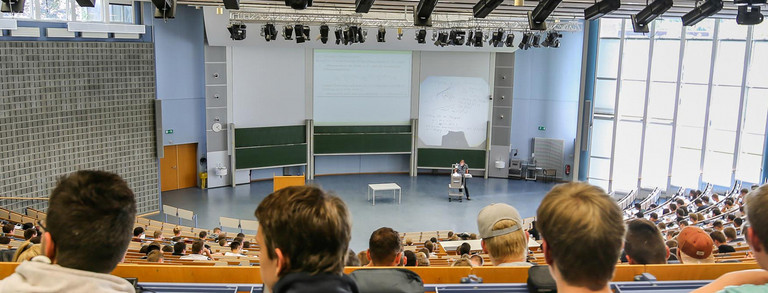Master (1 subject)
Physics tries to measure quantifiable natural phenomena by means of specific experiments and to describe them theoretically by means of the simplest possible fundamental models. In constant cross-fertilization of experiment and theory, physics today has penetrated the realms of the largest dimensions - in astrophysics - as well as those of the smallest dimensions - in elementary particle physics. One of the guiding principles of the physics program at TU Dortmund University is to anchor the integration of experiment and theory, which has been so successful in research, already in the education.
Physics tries to measure quantifiable natural phenomena by means of specific experiments and to describe them theoretically by means of the simplest possible fundamental models. In constant cross-fertilization of experiment and theory, physics today has penetrated the realms of the largest dimensions - in astrophysics - as well as those of the smallest dimensions - in elementary particle physics. One of the guiding principles of the physics program at TU Dortmund University is to anchor the integration of experiment and theory, which has been so successful in research, already in education.
The education in the English-language specialization Process Systems Engineering enables students to design and operate complex chemical and biochemical production systems with the help of mathematical models and modern computer tools for simulation and optimization. Graduates also master methods of control and production planning as well as the analysis and description of experimental data. Process engineers are in great demand on the market, as it gives the chemical engineer the opportunity to acquire all the knowledge necessary not only for the planning of a chemical plant, but also for its simulation and optimization.
to the degree program Process Systems Engineering (Master of Science (M.Sc.))
The master's programme provides comprehensive psychological expertise and methodological skills that enable graduates to independently investigate scientific questions. With a strong focus on preparing for the master's thesis, a wide range of elective modules are offered, allowing students to specialise in various areas of psychology.
to the degree program Psychology (Master of Science (M.Sc.))
The M.Sc. in Construction Management and Real Estate Management teaches a holistic and interdisciplinary understanding of the economic, legal, technical and ecological principles of the construction and real estate sector. Students additionally gain a deeper insight into the particularities of a construction project from start to finish, i.e., in terms of structural and process engineering as well as workflow. The M.Sc. can lead to a further academic qualification in teaching and research by attaining a doctoral degree and represents an excellent professional qualification for work in construction and real estate management.
to the degree program Real Estate and Construction Management (Master of Science (M.Sc.))
Rehabilitation education deals with social rehabilitation and pedagogy in the context of the professional, social and digital participation of people with disabilities on an interdisciplinary basis.
to the degree program Rehabilitation Pedagogy (Bachelor of Arts (B.A.))
The Rehabilitation Sciences degree program is a consecutive Master's degree program and serves to deepen specialist knowledge and scientific working methods for fields of work with rehabilitation pedagogical requirements in an inclusive society.
to the degree program Rehabilitation Sciences (Master of Arts (M.A.))
Important facts about Master's programs (1-subject)
- The master's degree is the second qualifying university degree. As a rule, a bachelor's degree has already been successfully completed in advance.
- The standard period of study in the Master's program is at least one and at most two years.
- Depending on the course of study, TU Dortmund University awards the degrees Master of Science (M.Sc.) and Master of Arts (M.A.).
- Within the scope of the 1-subject Master's degree, you will study one course of study.
- The Master's degree enables you to pursue a doctorate.





![[Translate to English:] Partner Four hands are holding the green logo of TU Dortmund University](/storages/tu_website/_processed_/1/d/csm_Partner_Nicole_Rechmann_KW_670eba0154.jpg)




![[Translate to English:] Forschung An apparatus with tubes in a laboratory](/storages/tu_website/_processed_/0/c/csm_Forschung_Juergen_Huhn_4fa3153b51.jpg)
![[Translate to English:] Studium Five students are sitting in a lecture hall. They are talking to each other.](/storages/tu_website/_processed_/c/9/csm_Studium_FelixSchmale_dbdbfb0dd7.jpg)





